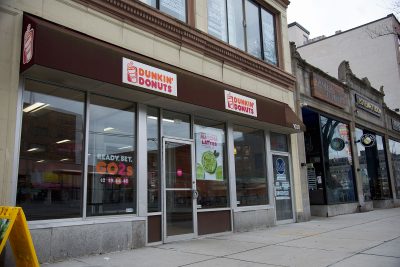New England Patriots quarterback Tom Brady is more popular in Massachusetts than Gov. Charlie Baker, who remains among the most popular governors in the nation. Yet, Brady is not as popular in the Commonwealth as coffee and donut chain Dunkin’.
A poll released Friday by the Center for Public Opinion at University of Massachusetts Lowell released these and other interesting findings while surveying state residents.

CPO Associate Director John Cluverius said that in conducting this public opinion poll, the Center asked participants whether they had a favorable or unfavorable view of someone or something. This data then contributes to the net favorability rating attributed to each subject.
“And then also they have the option to tell us whether they have no opinion about something or they’ve never heard of something or someone,” Cluverius said. “The goal of asking the question the same way is to be able to compare a lot of different people and things on the same scale.”
The poll also revealed Sen. Elizabeth Warren and Sen. Bernie Sanders — both top contenders in the 2020 presidential primary race — are in a close battle for first place in Massachusetts public opinion, with Sanders edging out Warren by 1 percent.
Out of 450 likely Democratic voters in the March 3 primary, Sanders received 21 percent of the support while Warren received 20 percent. The results were collected Feb. 12 through Feb. 19.
The respondents consisted of panelists recruited and provided by global public opinion company YouGov, which pre-screens its panels to source out respondents who meet the criteria of its clients’ polling projects.
While the CPO sets targets for which demographics to reach, not everybody responds to surveys. This is why, Cluverius said, it’s difficult to create a truly random sample.
“If we don’t hit those targets, we do survey weighting, which weights some people more than others to create effectively a representative sample,” Cluverius said. “It’s very, very handy. We use weighting to help create a sample that looks more like what we think the electorate will be.”
University of Texas at Austin professor Daron Shaw, an advisory board member of the Massachusetts Institute of Technology Election Data and Science Lab, said weighting is a standard polling practice that accounts for populations that cannot otherwise be sampled properly.
“The assumption is that the people that I have from my underrepresented group are representative of those generally,” Shaw said. “In other words, there’s nothing systematically different about the young people that I got ahold of compared to young people generally.”
Local residents in Boston shared their thoughts on the methodology of public opinion polling and the accuracy of the results they produce.
Michael Kenoyers, 28, of Brighton said that before interpreting the data found by any certain poll, it’s important to find out how the survey was conducted.
“I think it’s good practice before you really start to just completely believe the polls,” Kenoyers said, “to look up the crosstabs and the methods because that’ll give you a very different idea.”
Regardless of pollsters’ efforts to produce the most accurate results, Cluverius said polls are still only a snapshot of true public opinion.
“Polls are a snapshot so a good measure of where the electorate is at a certain point in time, but they’re not always predictive of the future,” Cluverius said. “And I don’t really think that they affect people’s choices in the long run.”
Christopher Conley, 28, of Brighton said there exist so many polls showing ranging results that he has trouble determining which to look at.
“The differences between them sometimes can vary so much,” Conley said, “that it’s hard to know what’s the most accurate description of what the political landscape is.”


















































































































